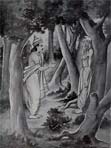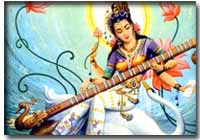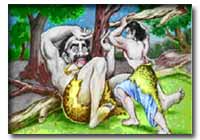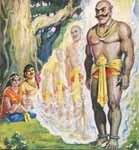THE WAX PALACE
 |

When everything was ready Yudhisthira decided to forestall Purochana’s attempt. Choosing a dark midnight Bhima set fire to the palace of wax as well as the quarters occupied by Purochana at the gate and the Pandavas escaped through the passage well prepared for the escape. The palace was soon engulfed in fire and together with Purochana’s dwelling place was reduced to ashes. As it became evident that the palace was constructed of combustible materials like jute, ghee and oil, the evil genius behind the construction could easily be guessed. The irony was the death of Purochana as a victim of his wicked plot. There were loud lamentations all round at the supposed death of the pious Pandava princes and everybody cursed Duryodhana.
The news of the death of the Pandavas reached Hastinapura. Dhritarashtra was loudest in the lamentations, a state mourning was announced. Dhritarashtra was like a deep water reservoir, cool at the bottom and warm at the surface and entertained secret joy at the bottom of his heart. The traditional funeral rites were performed. The most unhappy man was Bhishma who said to Vidura "You are a philosopher and you are quite unperturbed at the tragic news. Look at my sad plight. Chitrangada and Vichitravirya, Pandu and Pandavas all died before my eyes. I am quite upset by the premature death of the promising princes under mortifying circumstances." Vidura confided to the Pitamaha "Pandavas and Kunti Devi are alive. They crossed the frontiers of the Kuru territory in the boat secretly provided by me. The boatman has already conveyed the news to me. Hastinapura is not a safe place for them now. They are resourceful enough to protect themselves. Let us wait and see." Bhishma was very happy that the Pandavas were alive and are bound to come back to Hastinapura at the right time. Vidura said to Bhisma in his usual philosophical vein. "Adversity is the best world as well as the greatest gymnasium. Fire purifies gold. Let the Pandavas emerge out of their own trials and tribulations as polished gems. A smooth sea seldom produces skilful sailors.

The Pandavas after crossing the Ganges in the boat provided by the fore vision of Vidura marched on undergoing many hardships. Sometimes Bhima carried Kunti on his shoulders. Sometimes they felt miserably oppressed by the sufferings they had to bear, beyond their heroic endurance. Sometimes they paused and rested. Sometimes Bhima kept vigil while his mother and brothers fell asleep fully exhausted. One night when Bhima was awake, keeping vigil, a giant cannibal Hidimba by name attacked the Pandavas. A fight ensued between Bhima and Hidimba. Hidimbi, the sister of the rakshasa Hidimba, who stood starring in amazement at the unusual strength of Bhima, fell in love with him. Hidimba was ultimately killed and Bhima married Hidimbi at the instance of his mother Kunti. As a result of the marriage, Ghatokacha was born and afterwards he served his father and the Pandava cause together with his rakshasa retinue.
On the way the Pandavas met Bhagavan Vyasa in the forest. They bowed to the rishi who blessed them. Kunti narrated their suffering to Veda Vyasa. The rishi smiled and said, "Human existence is a tangled web of light and shade. Joys and sorrows are the warp and weft of life. There is so much based in the best of us, so much good in the worst of us; no absolute assessment is ever possible. The complete sinner is as rare as the pure saint. The same person is a sinner when compelled and a saint when inspired. The coexistence of good and evil everywhere in the world finds its reflex in each man. Each and every one has to bear the consequences of his action. The wise person is equidistant to grief and exultation. The words of wisdom uttered by Vyasa provided the Pandavas with consolation as well as inspiration. After crossing the forest the Pandavas reached the city of Ekachakra disguised as Brahmins in accordance with the advice of Vyasa and settled there in the house of a Brahmin.

This was discussed by Kunti to Bhima and they came forward to help the people of the city and they decided on a plan. Yudhisthira returning home together with his brothers found Bhima in an exalted mood of extraordinary happiness and they could easily guess that Bhima was on the brink of an adventurous mission and asked Kunti to enlighten him. Kunti narrated her commitment. Yudhisthira said, "Mother can we afford to risk the life of Bhima who is our present protection and future hope? Kunti replied it is the duty of a Kshatriya prince to save the city from the ravages of the rakshasa. Soon the people of Ekachakra arranged a musical band to give Bhima a farewell. Children also joined the procession to bid farewell though they could not comprehend the tragic implications of the situation. Bhima stopped the procession at the entrance of the cave and asked all the people to go back.
As soon as Bhima entered the cave the rakshasa came out and a fierce fight started. They fought with stones and uprooted trees. Bhima was young and energetic. Baka was hungry and complacent that he was old and did not expect a dismal defiance. Bhima many a time tossed up the rakshasa and threw him to the ground. Finally he placed his knee on his back and slew him with his feet, blood oozing out from the nostrils and mouth of Baka. The corpse was dragged to the gates of the city by Bhima who was accorded a hero’s welcome by not only the children but also all the grateful citizens.

